Latimore - Interview 1993Originally published in our printed magazine issue 4/1993 - still availableCheck also full Album Discography by LatimoreThere are some artists I simply cannot resist and whose new album is always one of the highlights of the year for me. One of them is Latimore, whose Catchin up (Malaco MCD 7468) didn't disappoint me this time, either, though it wasn't as impressive as his previous outing, The Only Way Is Up. 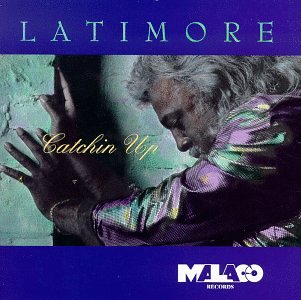
Once more, I must start with Frederick Knight tunes and production, because on many recent Malaco recordings they just tend to stand above everything else. His four contributions here represent ”mellow meets intensive” blues & soul in an almost Let's Straighten It Out vein. Lay Another Log On The Fire we know by C.L. Blast already and another old tune, If I Had Loved You More, falls almost into an ”easy listening” category. Meet Me In The Middle Of The Bed and Your Sweetness Is My Weakness are fine soul ballads (no Barry White here). Of Latimore's own tunes, Skinny Little White Girl tells mainly in spoken a story about his used-to-be bass player, Miss Ann, Feed Your Hungry Man is a new, rather light midtempo swayer and Somethin' 'Bout Cha is, of course, a cover of his own '76 hit, though in this case I definitely prefer the original one. Then we have two Clarence Carter covers from his '69 Testifyin' album, Snatchin' It Back and I Smell a Rat – both co-written by George Jackson – though also here I think that the Clarence tracks were more loose and energetic. Some throbbing funk (Catches up on Love), some straight blues (Deal Down and Dirty) and an excellent Billy Ray Charles seduction ballad, Shake the Sheets, with the chorus being a straight copy of Let's Straighten It out – that's the content of it. This fine album together with all the other magnificent albums Latimore has made call for an in-depth interview with the man himself. Benjamin Latimore was born on 7th of September in 1939 in Charleston, Eastern Tennessee, not far away from Chattanooga. ”My parents were not in the music business but my mother sang in church and she could play the guitar. My father could also sing and he played banjo, but not professionally. I have two sisters and both of them sing in church. One of my sisters also plays piano for church. My brother works with me on stage and he also drives for me. He used to play a little congos.” 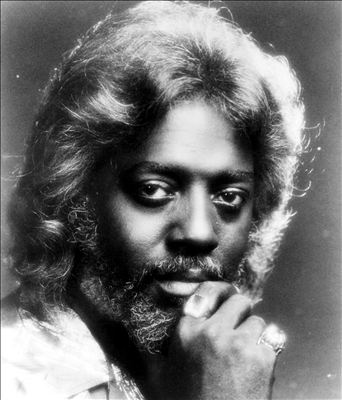
The early influences? ”Being in East Tennessee you hear a lot of country music all the time, but at night there was a station who used to play blues, and that sort of influenced me too.” What about the first musical steps, a school band perhaps? ”Not a school band. We founded a little group and we played on a few talent shows, but we never thought of it as becoming professional musicians, it was just for fun.” But little by little music started to get a hold of the young lad. ”When I graduated high school and went away to college to Tennessee State University, which was located in Nashville, Tennessee, I started singing with a group on a campus, and that's when I really started getting interested, 'hey, this is what I wanna do for living'. Then I got a chance to audition for being a vocalist for a group called Louis Brooks & His Hi-Toppers. I auditioned with them and they liked me, so I started singing with them – I guess you could say professionally, because I got paid for the first time. Next I met Joe Henderson in Nashville and toured with him as a keyboard player and featured vocalist. I opened the show, then introduced him and played keyboards behind him. I was with him for a short time. That was the first time I had a chance to travel, and we went all over the United States. When I left Joe I went to Miami to live, that was in about 1962. Freddie Scott's (not the singer, but a band leader and a drummer) Orchestra was in Miami. We played together for quite a while. I was a vocalist and a keyboard player.” Then we come to Latimore's first ever single, a slow tune called I Can't Go On Any More backed with Rain From The Sky on the Blade label in '65. It was produced by Brad Shapiro and Steve Alaimo. ”I had met Steve before. He was a performer then and we (Joe Henderson's Band) had played some gigs with him. We also did some tracks with him for the Where The Action Is show. He was involved with Henry Stone out of Miami, who had Blade and Dade records which eventually became TK.” The next single, an uptempo, catchy r&b swayer, Girl I Got News For You, backed with a rousing r&b stomper, Ain't Gonna Cry No More – the first ever Latimore tune recorded? – was released on Dade in '67, which is two years after the first single. ”We were just busy doing local gigs and playing behind other people and also playing on their recordings. 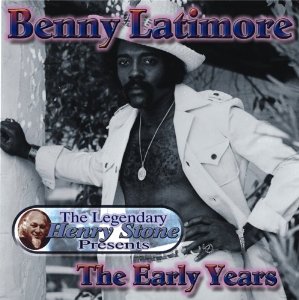
Ain't Gonna Cry No More, yes, I would say it's the first one I wrote just for myself. I was a part-writer on I Can't Go On Anymore.” A pleading big-orchestrated ballad There She Is together with a Billy Nash r&b stomper It Was So Nice While It Lasted were recorded in Muscle Shoals as were all the following singles (It's Just A Matter Of Time / Let's Move And Groove Together, Have A Little Faith / I'm A Believer, I Pity The Fool / I'm Just An Ordinary Man, I'll Be Good To You / Life Has It's Little Ups And Downs) with the exception of a much sought-after '68 single, The Power And The Glory / Love Don't Love Me, which was recorded in Miami. Altogether Latimore recorded nineteen Blade and Dade sides (in '65-'70), but not everything was released. ”Yeah, a lot of the stuff was not released. We were doing a lot of singles at the time – we were not doing albums that much – and we just picked up some of those songs and decided that this is the one we're going to release. At the time Atlantic was doing some distribution for the company, and a couple of times they released the product on some of the Atlantic labels (I Pity The Fool).” Hopefully someday somebody's going to release all those Blade & Dade sides, because they are very appreciated in soul circles. Benny's singing is mostly very intensive, not unlike what (the singer) Freddie Scott used to do in those days. 
The seventies saw Benny still working for Henry Stone, now for his newly founded TK consortium and more precisely for a label called Glades. The debut album, Latimore ('73), was produced by Steve Alaimo and arranged by Mike Lewis. On drums there was an old pal, Freddie Scott, and on background vocals Betty Wright and then still unknown Gwen and George McCrae, signed to Cat and Blue Candle labels. The first single, though, was produced and written by Al Kooper. ”Me and Al Kooper are friends. Al had heard me sing and suggested a couple of tunes he would like to do on Latimore. He met with me to see if I liked the idea and I said 'sure'. He had these tunes 'Jolie' and 'Be Yourself, Be Real' that we did.” There were many familiar tunes on the album: If You Were My Woman (Gladys Knight & The Pips), Take Me To The Pilot (Elton John), Power And The Glory (a rework of the Dade single), So Much Love (Goffin & King) and For What It's Worth (Stephen Stills). ”They were just the songs that I liked at the time, and I thought of doing my own version and adding my flavour to the songs. The album did pretty good. It wasn't a smash but it did so well it was great for me because I hadn't sold any albums before, so it was all new to me.” From the album came the first surprise hit, a jazzy, swinging, ”snap-your-fingers” interpretation of T-Bone Walker's Stormy Monday. Who came up with this special arrangement? ”I did. I had been doing it in the clubs. In nightclubs I had played sometimes jazz, and I started doing a little jazzy version of 'Stormy Monday', and when we were in the studio and needed another tune I said 'why don't we do this', and it turned out pretty well. I also played a little instrument called melodica on that because I used to play that in clubs too. It wasn't something that was planned. It was a quick thing, we just decided 'let's do it'. It was just one take for the basic groove (piano and the bass line), then I came back and overdub the melodica and my voice, and that was it.” 
The second album, More More More Latimore ('74), offers us some more swinging jazzy arrangements like on Bobby Bland's Ain't Nothing You Can Do, Joe Henderson's '62 hit Snap Your Fingers, Willie Mabon's I Don't Know and Everyday I Have The Blues. But there are also some great ballads on display like Willie Hale's (Little Beaver) That's How It Is and a painfully slow, Ain't Nobody Gonna Make Me Change My Mind. But the album is best remembered for one particular song, the biggest hit in Latimore's career, his own tune and a soul no. 1 in '74, Let's Straighten It Out. Where did the idea came for that classic? ”It's from a personal experience. I guess everybody has to straighten it out sometimes, whether it's with your wife, husband, your friend, your boss, your employee – whatever relationship you have with another person or persons. I think maybe that's why it became so successful because everybody can identify with it one way or the other. I more or less made it more like man / woman type of thing, but it carries over to other parts of your relationship too.” 
Latimore III ('75) had a little funkier touch. ”It was just getting in touch with another side of me. I was always a person who would like to experiment a little bit, not particularly trying to follow a trend, and hopefully people will like it.” The album's best-known song is Keep The Home Fire Burnin', which Millie Jackson also covered, and this was just one of the many Latimore tunes Millie has covered. ”Some of them I like really well. She is a great friend of mine, she's a great artist plus her covers made me some money (laughter). And still does, as a matter of fact. I still get royalties from her recordings that have sold well.” To my mind Latimore's next album, It Ain’t Where You Been... ('76), is his best up to this point with many fine and mellow blues & soul tunes like Somethin' 'Bout Cha, All The Way Lover and Let Me Go. All the songs were self-written with the exception of a slow version of George McCrae's hit, I Get Lifted. 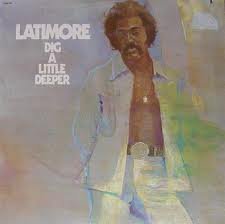
Dig a Little Deeper ('78) once again offers us melodic and mellow funk (Long Distance Love, Out To Get 'Cha, We Got To Hit It Off) together with great deep soul ballads (Latimore's own title ballad and George Jackson's Ain't Nothing Like A Sweet Woman's Love). All the Glades albums were produced by Steve Alaimo, but the next one, Getting Down to Brass Tacks ('80), credits Marsha Radcliffe and Latimore himself. ”Marsha was an engineer at TK. She worked with me, so I gave her half of the producer credits on this particular one. We thought this is going to be such a great album, and it was, it's one that I'm proud of. But it did not sell that well, because at that time TK was on its way out and had real problems and was starting to fold. The record was liked by many people but there was not that many available, and there was no promotion. It's not that I didn't want Steve (Alaimo), I just wanted to have freedom to do it myself, because I knew I was capable of doing it. With Marsha we had a very good relationship, we trusted each other and we could be very honest with each other. I think we came up with a good album, I'm proud of it.” So, what is Latimore's own conclusion about the Henry Stone period. Anyway, it was fifteen years ('65-'80). ”It was a very enjoyable period. It was like another family. Nobody had any sort of professional jealousy. We used to sing and play on each other's records. If somebody needed a keyboard part, I'd do it. If I see Betty Wright or somebody I'd say 'hey, I need a little background part' – no problem. Nothing like 'how much are you going to pay me for this'. We all felt sort of a kinship. But then the disco thing came in, and it sort of changed things. Disco became so BIG and they became deeply involved with the disco that everything else was sort of pushed back. So that part of it was not really enjoyable. But I understood it, because it made a lot of money, and I got part of that money too (laughter), but money isn't everything in the business. We got to the point where we no longer had that real closeness. Everybody was starting to get off on their own, and it was 'you call my people, and my people will call your people', you know, it lost something.” What about Henry Stone on a personal level? ”Personally I know that he's a very astute businessman. He took care of me pretty good. I understood that in business you have to pull a lot of strings. He used to do a lot of under-the-table stuff. Some of those things I didn't like, but I understood that was part of the success of the business. I probably didn't get paid all the money that I should have, but there I have to take some of the responsibility on myself, because I got paid everything I asked for. When I went in and asked for 20 000, I probably should have asked for 100 000 (laughter).” So, it was bye-bye to Henry and hello to Malaco. What was Latimore doing in the meantime? ”Not very much. I was still working on the road and I couldn't decide. I was pursuing some record companies and some record companies were pursuing me, but I did not want to go to one of the big ones, because I was afraid that I would miss that family type of thing. I know that with some of the big record companies you can take the chance and you can make it or not, but if you don't make it they just shove you back in the corner. My main purpose was to be able to stay alive and keep working, to be able to put out records, and I saw Malaco as a company who's going to grow. Of course after signing with them I did not like the fact that they didn't promote as much as I thought they should, but I understood that was a pragmatic decision financially. But once I'm there, whatever the program is, I'll try to deal with it. We've had our ups and downs, but the ups have been better than the downs. Malaco approached me, but I've known them before. Even when I was with TK they always told me that if I was interested to come and talk to them. Z.Z. Hill really influenced me to go to them. We worked together a couple of times and he said 'you know, I just signed with this record company, they specialize in blues'. I said 'you know, I'm not really all the way traditional hard core blues artist, more like a soul singer who is influenced by blues'. He said 'is it alright, if I have one of them to call you'. 'Sure'. So they called me.” 
The first Malaco album, Singing in the Key of Love ('82), was produced by Tommy Couch and Wolf Stephenson and it contained many familiar tunes: Bad Risk (co-written by George Jackson and recorded by Millie Jackson), Here I Am Again (written by Phillip Mitchell and recorded by Candi Staton) and Do That To Me One More Time (Captain & Tennile). But the best stuff was Latimore's own tunes like Let The Doorknob Hit 'Cha and the title tune. In his style there's really no difference between Glades and Malaco. I'll Do Anything for You ('83) had Sara Smile (Hall & Oates), You (by Frederick Knight, appears on Johnny Gill's debut album), Take Me Down (done also by Johnny Bristol) and on the original front fine soul ballads like George Jackson's Out To Lunch, Frank Johnson's We Don't Make Love Anymore and a duet with Denise LaSalle, Right Place Right Time. But it also had a cover of Let's Straighten It Out. ”One of the guys at Malaco thought that we should redo it. I said 'you know, it'll be hard to capture the feeling that we had on the original'. But we did a version of it. It was nice and I enjoyed it, but it did not quite have that same mellow feeling that we had on that other recording.” 
Good Time Man ('85) was co-produced by Latimore and it contained many tunes by Denise LaSalle and Leonard Gibson. Leonard who? ”You're looking at him. It's a pseudonym that we used.” Every Way But Wrong ('86) had a little lighter sound (like Sunshine Lady and the Phillip Mitchell tunes, Body Shop and She's All That). ”I guess, it's a little bit more poppish. But we were not trying to make a pop record. You know, we're having trouble getting air play, so we thought that maybe if we go a little lighter on some of the songs, it'll help. People at the radio stations will categorize you, and as soon as they hear your name they say 'oh no, you don't fit our format' without first listening if it's programmable or not. We were going through a period when we had a hard time getting programming and high rotation. I mean, they play your record maybe four o'clock in the morning once a week.” 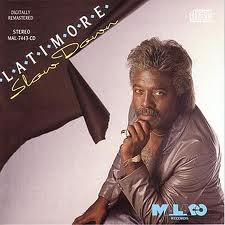
Slow Down ('88) was produced mainly by Jimmy Lewis and Rich Cason. ”We were looking for something different for me. These guys wrote some songs (four Jimmy Lewis tunes, the familiar ones being 'Careful Man' and 'That's The Way That I Do It' = 'Is That Any Way To Treat A Lady') that they thought would be perfect for me. I went out to California and did most of the album out there, but it was not a good combination of me and their way of recording. They used a lot of synthesizers. I don't mind using them but I like to use them limited.” (agreed, witness some rather awful funks). 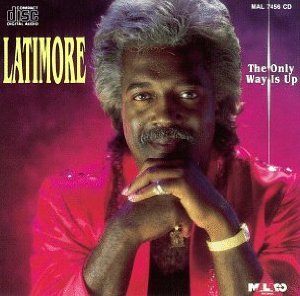
On The Only Way Is up ('91), a great album, half of the tracks were written by Jimmy Lewis. Any chance of carrying on with this successful musical partnership? ”We might get back together again, but on my latest album, Catching Up, Jimmy Lewis wasn't on.” The album offers a rework of Latimore's own Take Me To The Mountain Top, Jimmy's own It Ain't What's On A Woman, a Johnnie Taylor '77 recording Stop Half Lovin' These Women and of course the title track. Who came up with the idea of a slow version? ”We sort of came up with it together, me and George Jackson, who wrote the song. He said 'we could do a slower version, it would really fit you' and I said 'ok'.” How does the future look like? ”This new album looks pretty good so far. The initial reaction and the response we got from the people in the business is that they think this is going to be the biggest I've ever had, but you never know. I hopefully will be coming back to Europe more often and with my own group.” What about Latimore's own favourites? ”My own favourite album would probably be the one that me and Marsha did ('Getting Down To Brass Tacks') also because of the effort that we had to put at it with the equipment breaking down and all kinds of bad luck. But still it came out great, and it was my first project that I did where I'd take the full responsibility for it. And maybe that's why it's like my baby. Over the years the song that has had the most reaction is 'Let's Straighten It Out'. I have gotten so many responses from people and I still do this on my show all the time. I can't go anywhere without doing this.” What's the soul scene in Miami like these days? ”There's not very much of a soul scene. I know very little about what's happening in Miami even though I live there. I go home, I don't go to clubs or anything, at home I wanna be completely away from the music business. This is how I balance my life and recharge my batteries. And that's why I'm not burned out. I have grown daughters from my first marriage, all of them over thirty, not in business, and one daughter from this marriage, she'll be fifteen.” So, finally, how does Latimore see the future of his kind of music? ”I see it as very bright, because what goes around comes around. This is something that has always been. My kind of music is deeply rooted in the blues and blues is the roots of it all. All the other stuff is just branches and leaves of the tree. Leaves fall off, but the main thing is always there.” © Heikki Suosalo Check also full Album Discography by LatimoreBack to Deep Soul Main Page Back to our home page |